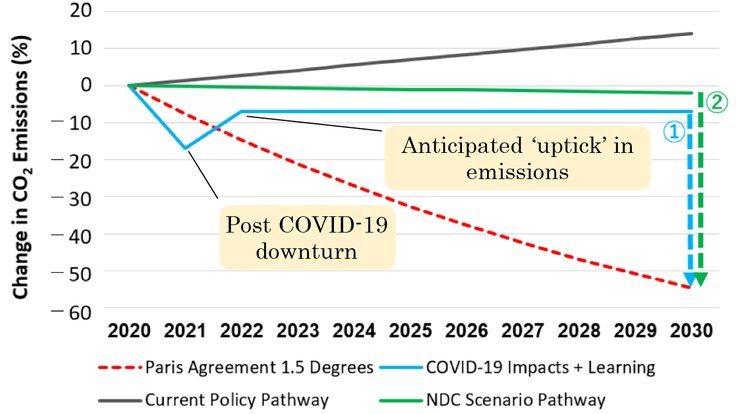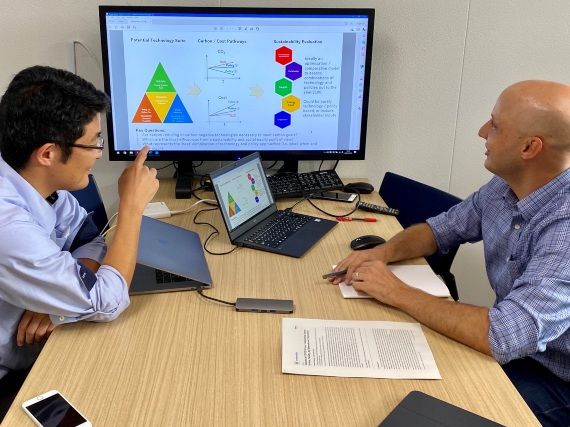研究成果 Research Results
- TOP
- News
- Research Results
- Uncovering COVID-19’s impact on the energy transition
Uncovering COVID-19’s impact on the energy transition
Researchers find lessons from the pandemic that can be applied to reducing emissions and achieving SDGs 2020.11.02Research ResultsHumanities & Social SciencesEnvironment & Sustainability

Carbon emission pathways and targets cognizant of national agreements, goals and COVID-19 learning. The gap between 1 and 2 demonstrates the impact of capitalizing on these learnings. NDC refers to nationally determined contributions under the Paris Agreement.
Exploring the unique set of scenarios put into motion by the COVID-19 pandemic, researchers from Kyushu University have identified short and long term impacts it may have on achieving global carbon emission targets and the Sustainable Development Goals along with lessons that can be learned to help advance these global initiatives.
“The rapid spread of COVID-19 globally reinforces the fact that the earth is a closed system, and this recognition is also key for tackling the global challenge of climate change,” says Andrew Chapman, associate professor at Kyushu University’s International Institute for Carbon-Neutral Energy Research and one of the authors on the study published in the journal Sustainability.

Takeshi Tsuji (left) and Andrew Chapman discuss the impact of COVID-19 on energy challenges in a collaborative effort that sprung from their desire to make a research contribution in light of the pandemic.
While the pandemic has led to a reduction in mobility, leading to improved air quality and a reduction in greenhouse gas emissions, nationalism has also emerged, presenting a barrier to international cooperation toward achieving environmental targets and the Sustainable Development Goals (SDGs).
Though some of these reductions in emissions are expected to reverse as economies aim to return to pre-COVID-19 levels, the experiences so far provide real evidence and data for understanding strategies for and the impacts of efforts such as teleworking initiatives and supply chain diversification that can be applied to fighting climate change.
The researchers also evaluated the impacts of COVID-19 on the progress of the SDGs and found that reduced inequalities (SDG 10), climate action (SDG 13), and partnerships for the goals (SDG 17) in particular are being negatively affected, indicating they should be prioritized and may require more cooperation to be solved.
“By accepting that the earth is a closed system, we can capitalize on reduced emissions and work together to address critical climate challenges under the framework of the SDGs,” explains Chapman.
“This research highlights the need for a focus on SDGs 10, 13 and 17, and identification of appropriate technologies and policies to ensure a successful low carbon transition is also a key aim of our ongoing joint research,” he concludes.
###
For more information about this research, see “Impacts of COVID-19 on a transitioning energy system, society, and international cooperation,” Andrew Chapman and Takeshi Tsuji, Sustainability 12(19), 8232 (2020). https://doi.org/10.3390/su12198232
Research-related inquiries
Andrew Chapman, Associate Professor
International Institute for Carbon-Neutral Energy Research (I2CNER), Kyushu University
Contact information can also be found in the full release.
- TOP
- News
- Research Results
- Uncovering COVID-19’s impact on the energy transition































